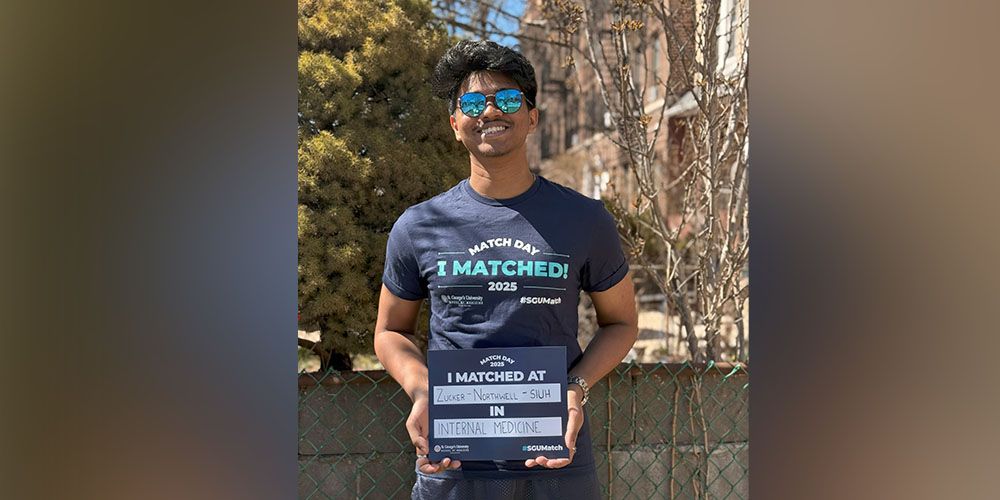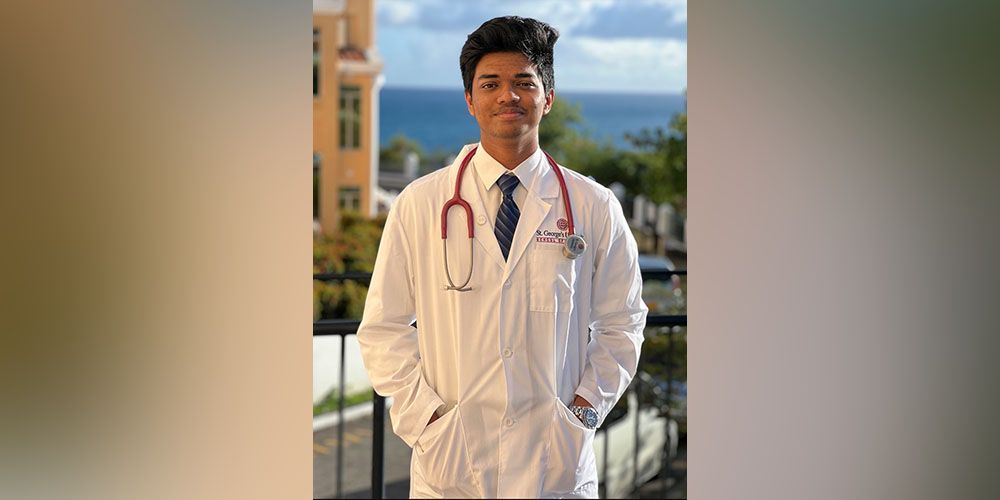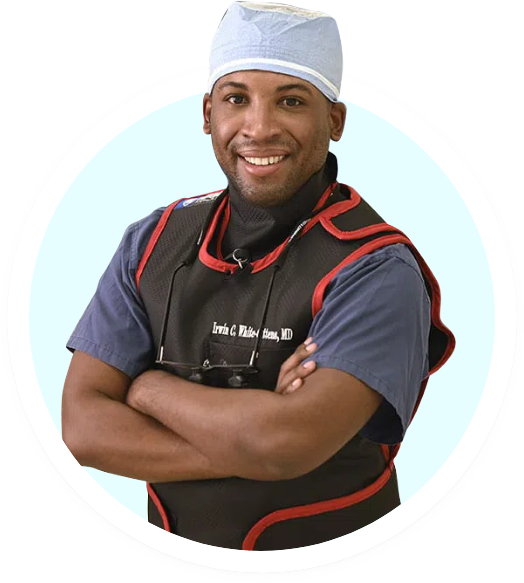For St. George’s University School of Medicine alumni Leonard Leo Visvaas, MD ’25, the appeal of internal medicine lies in its complexity and constant challenge.
“What drew me to internal medicine was the mystery—you never know what the next patient might come in with,” he said. “I enjoy that challenge, along with the continuity of care and the relationships you build over time.”
As he advanced through his clinical rotations, cardiology emerged as a clear area of interest. “The physiology is fascinating, the interventions are impactful, and it strikes a balance between critical care and long-term management. It’s definitely a field I see myself specializing in,” he shared.
Dr. Visvaas envisions becoming the kind of physician who is not only clinically sharp but also deeply connected to his patients. “I always want my patients to feel heard and empowered,” he said. “Long-term, I also hope to be involved in teaching and mentoring, just like those who guided me, to help shape the next generation of physicians.”
His path to medicine began in Chennai, India, where he grew up as the first in his family to pursue a career in healthcare. Drawn to science from an early age, he was especially inspired by the opportunity to make a meaningful impact through medicine. Today, he is an internal medicine resident in the Zucker School of Medicine at Hofstra/Northwell at Staten Island University Hospital Program in New York.
SGU News sat down with Dr. Visvaas to learn more about his journey and how SGU helped him reach his dream of becoming a doctor in the United States.
SGU: How did SGU help you achieve your dream of practicing in the United States?
Dr. Visvaas: I always intended to become a doctor in the United States, as I am drawn by the structured, systematic approach to both education and healthcare. The emphasis on protocols, thorough documentation, and coordinated care deeply resonated with me, and I knew this was the kind of environment where I wanted to grow and practice medicine.
SGU played a pivotal role in helping me achieve that dream. The preclinical years in Grenada gave me a strong foundation in the basic sciences, while the clinical rotations in the US exposed me to a wide range of healthcare settings and specialties. I truly appreciated the way SGU integrated me into the US medical system early on, which helped me develop both clinical skills and professional confidence.
Along the way, the faculty, advisors, and support staff were incredibly encouraging and accessible, guiding me through everything from coursework to board exams and residency applications. Now, as I start my internal medicine residency, I’m proud of how far I’ve come and grateful to SGU for helping me get here.
SGU: What did it feel like when you matched into residency?
Dr. Visvaas: It was an overwhelming mix of joy, relief, and gratitude. After years of hard work, sacrifices, and uncertainty, seeing that “Congratulations, you have matched” message felt surreal. It was one of the most validating moments of my life. I immediately thought of all the long nights, the exams, and the support I received from my family, friends, and mentors—everything had led to that one moment.
Matching into my top-choice internal medicine residency made it even more special. It felt like everything had come full circle, and I was finally stepping into the role I had worked so hard to achieve. I couldn’t stop smiling for days.
SGU: What was your experience during the Match process? How did SGU’s Office of Career Guidance (OCG) help you during that time?
Dr. Visvaas: The Match process was definitely one of the most intense and nerve-wracking parts of my medical journey. There’s so much riding on it, and it’s easy to feel overwhelmed with applications, interviews, and the pressure of ranking programs. But throughout it all, OCG was a constant source of support and direction.
From the very beginning, OCG helped me refine my personal statement, tailor my CV, and prepare for interviews. They were always responsive and willing to provide detailed feedback, which made a huge difference in helping me present my best self to programs. Their webinars, one-on-one sessions, and mock interviews helped me stay organized and confident throughout the season.
More than anything, they made the process feel less isolated. Knowing I had a team behind me who genuinely cared about my success made a world of difference. I’m incredibly grateful for their guidance; it truly helped me match into a residency program I’m excited about.
SGU: How did SGU contribute to your academic success and prepare you for the USMLE exams?
Dr. Visvaas: SGU played a big role in shaping both my academic success and my USMLE preparation. From the very beginning, the curriculum was structured in a way that built a strong foundation in the basic sciences, which really helped when it came time to prepare for Step 1. The integration of clinical scenarios into our learning made it easier to apply concepts rather than just memorize them.
What stood out to me the most were the academic resources—like the small group discussions, tutor sessions, and especially the Honors Selective.
For Step 2, the clinical rotations provided a wide range of exposure, and being actively involved in patient care taught me how to think critically and manage real-life cases—skills that translated directly to the exam. The emphasis SGU placed on self-directed learning also helped me develop a study rhythm that was consistent and effective during dedicated prep time.
SGU: What was the highlight of your experience living in Grenada during your Basic Sciences years?
Dr. Visvaas: One of the biggest highlights of my experience living in Grenada was the sense of community. Being surrounded by students from all over the world, all working toward the same goal, created this unique atmosphere of support and shared motivation. It really felt like we were all in it together, and that made the challenges more manageable and the wins even more meaningful.
Outside of academics, Grenada itself was beautiful and offered the perfect backdrop for finding balance. Whether it was watching the sunset at Grand Anse, exploring local food spots, or just walking around campus, those small moments made a big impact. Living in Grenada taught me resilience, independence, and how to find joy even in the busiest parts of life. It’ll always be a special chapter in my journey.
SGU: What was your experience during clinical rotations?
Dr. Visvaas: I did all of my clinical rotations in New York, and the experience was both intense and incredibly rewarding. Being in a busy, diverse healthcare setting exposed me to a wide range of cases and allowed me to work alongside residents who pushed me to grow every day.
One of the biggest takeaways was the importance of thinking actively, not passively—especially when you’re working in a group. It’s easy to just go along with what’s being said, but I learned that asking questions, offering differentials, and really engaging with the team is how you grow and earn trust. That habit of staying mentally engaged helped me gain more responsibility and become more confident in my clinical reasoning.
SGU: What is your advice to students to maintain a healthy mental well-being?
Dr. Visvaas: One piece of advice I’d give to students is to be consistent and choose discipline over motivation. Motivation comes and goes, but building a routine and sticking to it, even on the harder days, can keep you grounded and help you push through. Small, steady habits go a long way in maintaining both your performance and your mental well-being.
It’s also really important to make time for things that bring you joy outside of medicine. For me, that’s going to the gym, hitting the beach, playing video games, or building Legos. Those moments help me reset and remind me that balance is key.
And don’t underestimate the power of a good support system. Talking to friends, family, or mentors when things get overwhelming can make a huge difference. Finally, try not to compare yourself to others because everyone’s journey is different. Focus on your own growth, and don’t be afraid to ask for help when you need it. It’s not a sign of weakness—it’s how you stay strong.
SGU: What advice would you offer to aspiring medical students from your home country considering a similar path?
Dr. Visvaas: To aspiring medical students from India or anywhere else considering a similar path, my biggest advice is to trust yourself and stay consistent. Moving abroad for medical school can feel overwhelming. You’re away from home, learning in a new system, and adapting to a different culture. But if you’re willing to work hard, stay disciplined, and ask for help when you need it, it’s absolutely achievable.
Be open to growth in every way. Don’t wait for the “perfect time” to start preparing for the USMLE or networking. Start early and take small, steady steps forward. Build a support system, stay connected to your roots, and remember why you started. The journey might be uncertain, but with consistency and focus, that initial gamble can absolutely pay off.
–Published July 2025



